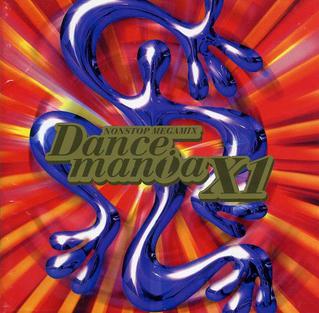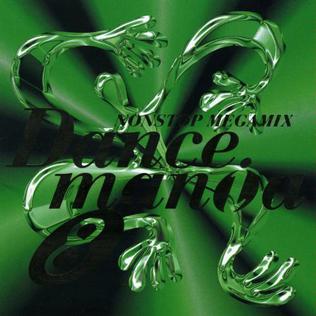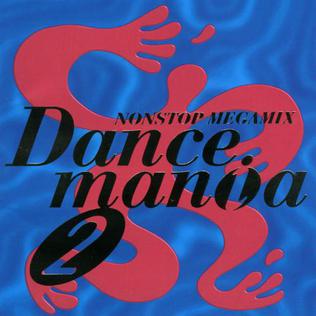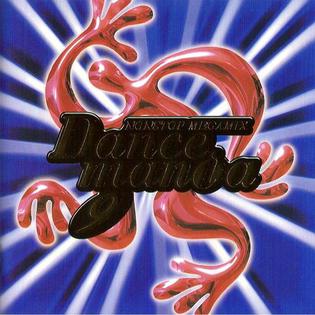Carlton George Douglas is a Jamaican-British singer best known for his 1974 disco single "Kung Fu Fighting".

Dancemania is a series of remix compilation albums by i-DANCE. The series deals primarily with dance music, especially Eurodance. Despite many of its tracks being made by various musicians from all over the world and mainly from the European continent, the albums have been released exclusively in Japan.

"Wild Child" is a single by Irish singer-songwriter Enya. It was released on 19 March 2001 as the second and final single from her fifth studio album, A Day Without Rain (2000).

Darren "Daz" Sampson is a British professional football manager/scout, music producer and broadcaster. Sampson is known for his commercial dance music as part of several groups and his television appearances. He has had nine Top 30 UK singles.
"Teenage Life" was the British entry in the Eurovision Song Contest 2006, which was sung by Daz Sampson in English.
Bang! are a British happy hardcore group from the late 1990s originally consisting of producer Nick Arnold, Tom Orton and female vocalist Donna Grassie. Nick Arnold and Tom Orton had previously been a members of the band Smart E's, who reached 2 in the UK in 1992 with their cover of the theme tune to Sesame Street entitled Sesame's Treat. After the release of "Cloudy Daze" which featured Donna, Tom Orton brought Jo James to the attention of Nick after a contact of Tom's, Jo's husband, presented to him a demo of his wife singing.

"Heart of Gold" is a song written and recorded by Force & Styles. It was first recorded and released on Force & Styles album All over the UK (1996) with the vocals by Jenna, and it was released as a single in 1998 with vocals by Kelly Llorenna. It is one of the most well known hardcore songs and was used as the name of Force & Styles's greatest hits album Heart of Gold. In 2002, Llorenna released a new version as her fourth solo single produced by Flip & Fill.

"Dub-I-Dub" is the debut single by Danish Eurodance duo Me & My, released in August 1995 from their eponymous album (1995). It was successful on the charts in many countries, peaking at number-one in Denmark and Japan, and being a top 10 hit in Belgium, Hungary, Iceland, Israel, Italy, Mexico, Russia, Spain and Sweden.
The music of Dance Dance Revolution is the collective soundtracks of the initial Dance Dance Revolution game in Konami's music simulation series. The soundtracks rely heavily on licensed music from Toshiba EMI's Dancemania series and also contain original songs produced by Konami's in-house artist Naoki Maeda. The original arcade game contains 11 tracks. Due to the staggered release of the game in other regions additional songs from newer releases in the series appear in the Asian, American and European releases.

Dancemania Speed is a sub-series of Toshiba EMI's Dancemania compilation series. This series features faster, further remixed versions of recordings from previously released Dancemania albums or faster remixed covers of various famous songs. Unlike the main series mostly consisting of Eurodance, this series largely consists of hardcore techno crews from the UK, the home of happy hardcore, and some Eurobeat Italians who are very much experienced in high BPM dance music.

Classical Speed is a sub-series of the Dancemania Speed compilation series, with uptempo dance remixes of famous classical music compositions.

Dancemania 10 is the tenth set in the Dancemania series of dance music compilation albums, released in 1998 by EMI Music Japan.

Dancemania X1, a.k.a. Dancemania 11, is the eleventh set in the Dancemania series of dance music compilation albums, released in 1999 by EMI Music Japan.

Dancemania 8 is the eighth set in the Dancemania series of dance music compilation albums, released in 1998 by EMI Music Japan.

Dancemania 7 is the seventh set in the Dancemania series of dance music compilation albums, released in 1997 by EMI Music Japan.

Dancemania 2 is the second set in the Dancemania series of dance music compilation albums, released in 1996 by EMI Music Japan.

Dancemania 6 is the sixth set in the Dancemania series of dance music compilation albums, released in mid-1997 by EMI Music Japan.

Dancemania 5 is the fifth set in the Dancemania series of dance music compilation albums, released in 1997 by EMI Music Japan.

Dancemania 9 is the ninth set in the Dancemania series of dance music compilation albums, released in 1998 by EMI Music Japan.
"Kung-Fu" is a song by English speed garage duo 187 Lockdown, released in 1998. The song was a top 10 hit, peaking at No. 9 on the UK Singles Chart. It also reached No. 1 on the UK Dance Singles Chart.














